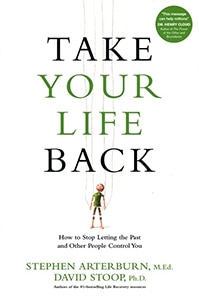Excerpt:
Steve Arterburn: And if you are saturated with guilt, shame, bitterness, anger – all these things, there is a whole other world waiting for you. But first, you got to decide, I’m going to take my life back.
End of Excerpt
John Fuller: Stephen Arterburn is back with us again today on Focus on the Family talking about the damaging effects of hurts and broken relationships. And welcome to our program today. Your host is Focus president and author Jim Daly. I’m John Fuller, and we have good news for you in this broadcast, that you can find the freedom that you’re longing for from the past.
Jim Daly: John, Steve and Dr. David Stoop have joined us to continue talking about the different wounds we experience as children, but also as adults and how those wounds continue to fester, particularly in adulthood. We want to find that healing from those wounds. That is what the Lord did so clearly in Scripture when he encountered everybody. Matthew the tax collector, you know, come on, Matthew. You’re ripping people off, right? And what did Matthew do? He went and gave back so much of what he had taken from people. That’s the encounter with Christ. He wants to make you whole. And it starts with our own recognition of our brokenness. I think that’s what this life is all about. I mean, there’s only so many emotions we can experience. There’s only so many directions we can go. And I think it’s so we can recognize that we need Him.
Steve: Amen.
Jim: And in that brokenness, what’s beautiful is He’s standing there saying, I love you. And I love you, even though I know you. And I don’t – I think freaks us out.
Steve: It does.
Jim: ‘Cause if we’re always saying to ourselves, if He really knew us, He wouldn’t love me. But He does. So that’s what we’re gonna talk about today.
John: And let me just say, Steve is the founder and chairman of New Life Ministries and is heard daily on New Life Live. Dr. David Stoop is a licensed clinical psychologist and the founder and director of the Center for Family Therapy in Newport Beach, California.
Jim: Welcome back to both of you.
David Stoop: Thank you.
Steve: Thanks for having us.
Jim: It was so good last time. I mean, I’m just reeling here thinking, uh, there’s so much more to talk about. If you missed that program, you can get the download,uh, for your smartphone, or you can call us and get the CD – whatever you need to do. I think it will be healing for you. And today we’re talking again with Stephen and David about their book,Take Your Life Back. David you were itching to get in there. What was it?
David: I always refer people to Romans 5,because it says,when we were sinners,when we were helpless, when we were His enemy, He loved us so much He sent his Son to die for us. And those three descriptive words, you can’t get any worse than that.
Jim: Yeah.
David: And…
Jim: But we don’t truly believe that, do we?
David: But we don’t believe that, no. We try to do what Romans 7does. We try to clean up our life to prove that God made a good decision to love us, and we don’t need to do that, because there’s no condemnation.
Jim: It is beautiful. And that’s the goal. I mean, where we can get to a place where we can accept ourselves for who we are and hopefully move closer to God, right? That’s the goal.
Steve: And you don’t do that by just going to church on Sunday, and maybe opening up the Bible every now and then. You really have to enter into a process, where you take your life back. And you take your life back, because there’s so many different ways that the world has grabbed onto it, and maybe you’ve even turned it over to certain things like pornography, or bitterness, or resentment – all of those things. We want you, uh, to be free of that. And, you know, in Ephesians 4:22,it says to throw off your old sinful nature. OK, so if you can’t do that, if you’ve tried on your own, and it just keeps coming back, this is what we’ve provided for you – a plan and a path and a process to take it back, so that the old sinful nature isn’t in control.
Jim: Let me ask both of you a very practical question. A person who comes to Christ and has that moment, and they feel different. They believe they are renewed. They know that. But those habits…
Steve: Right.
Jim: …Anything that you just mentioned, Steve…
Steve: Yeah.
Jim: …are still persistent. And then the enemy begins to pound that person and say, you’re no different, you’re no good. He would never love you. Why do you believe that?
Steve: Right.
Jim: How do you actually get that first rung, where you can grab it with your hand and you can begin to pull yourself up out of that humanness that is dark and say, OK, Lord, I’m moving in your direction?
Steve: Well, here’s the dilemma.When you come to Christ, or even if you’re delivered from some horrific thing, instantly healed or fixed,no one is ever delivered into character.
Jim: Hmm.
Steve: Nor have I ever seen a family delivered from all their resentment and bitterness and anger of all the stuff they went through, because this person was lost and really flailing out there. So, what do we have to do? We have to enter a process. It’s called discipleship.Some call it recovery. Some people call it sanctification.If you just take that experience, and then expect it’s all gonna fall in place, you’re gonna be very disappointed. And you’re very, very fertile ground for Satan to work in. So, it just makes sense that you’re not gonna do well going forward. It’s gonna to be superficial. You’re gonna fake it. And I certainly did that. And I – I became this super – even in my marriage, you know, I realized after my wife and I, uh, ate this wedding cake, um, we had a slight, little communication problem that never showed up before we were married. If I was a superhero, I would be known as “Bullet Point Man,” just, you know, tell me the headline, the bottom line, the deadline, all that. She – if she was a superhero, she would be “Wonder Word Woman.”
Jim: And detail.
Steve: And she has all of these things that crescendo into this fabulous display of communication. And what was that? It was a survival technique that I had. I didn’t want to get to the emotion and the depth. I wanted to stay at the surface, because once I sunk down in there, I didn’t know how to get out, and it was painful for me. I had to go through a recovery process of all that stuff, just to be able to have a connecting, normal, human being relationship with conversation that worked.
Jim: I so appreciate the description there that the road of sanctification is not a super highway. It’s a pot-filled dirt road.
Steve: Yeah.
Jim: And you’re gonna – your tires are probably going to go flat now and again. It’s work.
David: You need a companion along the way, too.
Jim: Hmm.
David: Somebody that’s been there and can mentor you in the process.
Jim: What does a child need? I mean, we’re all parents here. What – we’re the ones—and as our parents did—messing up. And, you know, it’s easy in this life to mess up our kids…
Steve: Yeah.
Jim: …Through our own fears, our own traps, all those things. As a parent, speak to me in that context. What do I need to do to really best establish my child spiritually in that character you’re talking about? What are two or three things that I should do to keep in mind?
Steve: Well, as you and I were talking before the program, just one of the things that I deal with my own kids is that basic need to understand that we have work to do.That it doesn’t all come easy. It doesn’t all fall in place. And as an adult, if you don’t have the value of work, and I’m not just talking about earning money – working on yourself. You don’t ever arrive. And, if you could instill in a child the value of work for work’s sake, maybe that child will carry that on in the teen and 20s and 30s, and continue to work on their soul and their character, and developing into the person God wanted them to be. But if we make it easy, feed into the entitlements, then most likely, they’re going to prove incompetent in – in the world, but also in developing the inner world.
Jim: Yeah. Dave, you’re a counselor. I’d like some practical examples – without names, obviously – but what do you see in the kids that come in that are broken, and why are they getting broken?
David: Well, I think a lot of times, they’re broken, because their parents haven’t been authentic with them, you know, uh. For example, I was talking with somebody whose husband had an affair. They’re separated.
Jim: So they’ve watched that, as the kids.
David: But the kids don’t know what’s going on, because they haven’t been honest with it, you know. And we said at some point, you’ve got to be – you’re teaching them to lie, and you’re not being authentic with them. And at some point, they’re going to say, why wouldn’t you tell me? And we said, you know, we were saying don’t – you don’t tell them all the details, but you at least are honest with them to what they can handle. And I think that’s a part of it. We bring our false self into our parenting role, trying to be something that we’re not, thinking that that’s what we’re supposed to be and set the example.
Jim: And the kids see that.
David: Kids see right through it. And if we can be authentic, the real self and talk about our struggles, our issues, and just like we’ve talked before about, if you have an argument, let them see the argument, but let them see the resolution to the argument. Just being real with your kids is a big step forward.
Steve: When I – as a teaching pastor at Northview, I did a series on this, and we have two campuses in two prisons. And so, our church bought 3,200 copies of this book, and every prisoner in this one prison got a copy of this book. And we went and we distributed them. And just the opposite of this weak and cowardly dishonesty that we display, I met this man there who came to Christ. Now, this prison – it’s a minimum 15-year sentence to get in the prison. And when I handed him the book, I just said, “How did you get here?” He said, “Well, I accepted Christ as my Savior. And then I realized I had to do something about that. And I walked down to the police station, and I went up to the counter, and I said, I’ve been having sex with a 12-year-old. And he said, my sentence is 30 years.” Now that kind of honesty, being willing to say, God, it – this life is yours, and I’m gonna do the right thing, the honest thing – I don’t know of a lot of us men or women that have that kind of courage.
David: Yeah, we’re supposed to.
Steve: That’s where true, authentic living begins. And guess what, he’s a little evangelist in there, in that prison. They respect what he did.
Jim:Well, that’s amazing.You know, in that regard, you look at, again, Scripture, you look at the Lord encountering Pontius Pilate, and it’s always been interesting to me that the Lord himself said what His mission was, right? To testify to the truth. He didn’t say to represent righteousness, to represent grace – to testify to the truth. There’s something powerful about that. That God wants us to know the truth. And when we know ourselves truthfully, we actually then can embrace Him honestly.
David: Yeah.
Jim: Right?
Steve: And then – and then there’s reality in the relationship.
Jim: There’s reality.
Steve: We see this in the Christian community so often, somebody will say, “well, you know, I’m not out there getting drunk, and I’m not using pornography and all this, and I’m not acting out.” But what we write about is, what’s much more prevalent, and that’s “acting in”. You’re not doing all the obvious stuff like us stupid people do. You’re, inside of you, rebelling against God with your anger, your bitterness, your judgmentalness, your shame, your believing that you’re better than everybody else. That kind of “acting in” is, in many ways, much more cancerous to the soul than those of us who “act out,” finally come to the end of ourselves, and say, I got to do something here.
Jim: That’s what’s hard with Galatians,when you look at Chapter 5, where the fruit of the Spirit is mentioned, but also the fruit of the enemy.
Steve: No kidding.
Jim: Those – those things that you just described – bitterness, divisiveness, disunity.
David: We don’t hear much about those.
Jim: We don’t. And I’m telling you, I’m on that. Because for me, there’s certainly sexual sin listed in that list, and I think a lot of people read that and go, OK, I’ve got control over that. But you start going through that list a little deeper, it’s everybody. Have you ever spoken with bitterness to someone, or jealousy, or, you know, all of that – that’s in that list, too. And so for us, it’s knowing the truth, and then, moving toward love, joy, peace, goodness, self-control – all those good things.Steve and Dave, both, let me ask you this.In the past, how have you created these false personas in your life, so we can learn from it? I mean, that’s the reason for the question, but what did you do as a man to create this facade?
Steve: Well, you know, I realized how much a facade I had when, um, my son was on the way. My wife was, pregnant, and we bought this piece of furniture, and Thor – the shipping guy – came out and helps me load it in the truck.
Jim: Thor? (laughter)
Steve: Thor let go of it a little too soon.
Jim: Six foot eight?
Steve: Yeah. And it just slammed down on my finger. And, you know, Thor looked at me and said, hey, did that hurt? And I said, no, I’m fine. Well, when Thor goes in, I start dancing around. I eventually lost the nail. My wife comes up, she hears me saying some things that might not have been in the New Testament, and she was pregnant, and I said, you know, “I think this is pain worse than childbirth.”
(LAUGHTER)
Jim: Oh my goodness. You didn’t say that.
Steve: I actually did. And that’s not the dumbest thing I’ve ever said. And – and when I looked back on it, I go, isn’t that the story of my life? Cover anything that shows weakness, or don’t reveal any of the pain. And it – and it just helped me to start to say, Steve, come on. You’ve got to open up more. You’ve got to be more authentic. You’ve gotta share. There’s no reason to hide. God knows who you are. Why don’t you share that with somebody?
Jim: Yeah. Can I challenge that a little bit?
Steve: OK.
Jim: And what I mean by that is, there’s no reason to hide, except it’s hard to be vulnerable in the church.
Steve: Yeah.
Jim: Now, I don’t know if that’s a self-taught thing, but we don’t do a great job with vulnerability.
Steve: Well, not every place is a safe place to share, and that’s why we like to see people start Life Recovery groups and have a safe place. But I say to folks, listen,it’d be better for you to show up on Sunday morning and in the bulletin your complete story is printed out for everybody in your church. That’d be better for you than to go through life, and no one knows your full story. You have to find the place to be open, but it is a challenge to us to– don’t be so quick to judge somebody who finally says, I want to be a real person.
Jim: I guess that’s my point. Again, it’s just human. It’s natural to cover, to hide and to do those things. And the body of Christ should be a place where people could come and talk through their difficulties. You know, the fact that I’m not doing this well, that my wife and I are struggling right now. Is there advice you have for me? I mean, David, you’ve been married 60 years, right? I’m sure – I’ve been married half that – you have some ideas and thoughts about how I could probably improve my relationship with Jean. But where do we find that safe place in the church? In the process of taking my life back, how do we encourage that community?
David: Well, that is difficult, because for most churches, they’ve been enculturated by our culture’s issues and standards. So, I go to church, and I dress well and look good and and don’t talk about my resentments or envies. And we stay caught in the “acting in” position of struggling with it. I did that for years. I was an associate pastor for 12 years while I was doing my training, and I did it not for bad reasons. I did it because I thought that’s what was expected of me. And since I was in a pastoral role, you don’t share anything personal. And, if I don’t share anything personal as a pastor, then nobody else is gonna do it. And, you just kinda continue in that way, until something doesn’t work, and you say something’s got to be different about this. We found, when we got to – finally got into the recovery process, that that was the place we could be honest.
Jim: Yes.
David: And so, a lot of times, you know, the corner bar, the AA meeting is more like what the church is meant to be than what the church is, because those aren’t enculturated, they have their own value system, which is to be honest and open and vulnerable.
Steve: Years ago, Dave and I were in a support group together, and there was a government official, there was a professional baseball player, therapist – it was quite heady. And I shared something out of my own life.
Jim: In the first meeting.
Steve: I just…
Jim: Set the pace.
Steve: I want to get this out there. I want people to know where I am. We never met again. It was too much of a challenge to…
Jim: Too honest.
Steve: And then you look what was going on in their lives – affairs and all this kind of stuff – you can see why. So…
Jim: So you just struck a raw nerve.
Steve: Because, they weren’t going to come back and feel the pressure to be open and honest about themselves.
Jim: Wow.
Steve: But if I had it to do all over again, I would do it all over again.
David: You might have done it in the second meeting.
(LAUGHTER)
Steve: Maybe – yeah, that’s true. Maybe I went too much, too soon. But over the years, in being open about my stuff, and to have people come up and say, oh, man, that’s my story. Thank you for sharing that. I mean, the value of that has been so wonderful, versus walking around being a fake and a fraud and thinking I don’t deserve to even be speaking to these folks.
David: When our son got caught in the drug culture, uh, there were Christians who said, I’d never go see Stoop for counseling, because he can’t even manage his own kids.
Steve: Hmm, yeah.
David: So we kept it secret for the first three years, and then circumstances made it – I was teaching a large Sunday school class, and we were up all night looking for our son, and I didn’t prepare my lesson, and I had to share my story. And people came out of the woodwork in terms of supporting. And from that point on, we shared our story,and we were in a church in Australia when we got a call that he’d been arrested, and we shared it with the people in Australia, and they said, well, we’re a praying church, and we’re going to pray for your son. And I think they’re still praying for him. And we just learned that you get supported by certain people, not everybody, when you’re honest and vulnerable. And it’s a shame that that’s not the true nature of the church, in general.
Jim: Yeah, and the best part is you moved down that road of sanctification that we talked about, you know, whether you’re in a good place or a bad place. That’s the process.
John: Yeah, and the starting point, uh, that we’re offering for you today isTake Your Life Back,the book by our guests. And you will be able to dig in deep, by yourself, in a safe way, and then take these concepts to others – your family members, your church. Get a copy of the book and our conversation to this point. We’ll include the rest of the discussion as well,focusonthefamily.com/radio, or 1-800-A-FAMILY.
Jim: Dave, in fact, let’s use an example of something small that seems to occur that ends up trickling into a rushing river. And what I mean, you had an experience with your mom and dad, I think, where you lost something, like a mechanical pencil, or something. And you mentioned it to your mom, and your mom promised not to tell your dad, because you didn’t want him to flare into anger. Finish that story. What happened, and how did it impact you?
David: He got angry with me, and he said, “and I know about that pencil, and you didn’t tell me” and, blah, blah, blah. I thought, that’s it, I’m done.
Jim: How old were you?
David: Six years old.
Jim: Six years old.
David: And I said, I’m done. And I with – I became very self-sufficient at that point, because I thought I was on my own.
Jim: Couldn’t trust your mom.
David: Couldn’t trust my mom, couldn’t trust my dad, and I had to take care of myself.
John: So you couldn’t get the perspective that this is a pencil, and It’s not the end of the world, and obviously, your dad didn’t have that perspective, either.
David: No, and it was interesting, I think, when I was about 14 or 15, I gave him a pencil – a mechanical pencil, a Sheaffer pencil, just like the one I lost – thinking that would kind of bridge the gap, and it didn’t mean a thing to him. I still have that pencil, and I’ve bought the fountain pen that goes with it. I’m a collector of old fountain pens, and that’s my prized possession, because of the meaning it had. When I was 11 or 12, I thought my real parents were going to come and rescue me and take me to live in Switzerland. I can remember that, too, as if it was yesterday. And…
Jim: Were you adopted?
David: No, I thought I was, you know. That’s the way I was living. These aren’t my real parents. They’re not safe, yeah. And so, when I got married, uh, I thought that would solve everything, but I still was kind of self-sufficient and didn’t need anybody, and that was a big part of our issues in the early days.
Jim: Man, I mean that…
David: That’s similar to what Steve felt when he felt – and we – I never told that story to anybody publicly, and that was one of those questions from the editors saying, “we gotta have another story, Dave.” And I told it, and Steve said, that’s the first time he had heard it. And then he shared his story, which was similar to it, but when he was a little older, and it’s first time I’d ever heard his side of it. We had similar experiences.
Jim: And I think people get the message here. They’re connecting with the pain. And I want to spend just the last few minutes talking about the healing.
Steve: Yeah.
Jim: And you talk about that in your great book,Take Your Life Back.Let’s talk about creating more of a paved road in that sanctification process.
Steve: Yeah, yup.
Jim: What are some things, knowing everything that we’ve talked about – steps 1, 2, 3 – how do we start the process of drawing closer to God and healing in these areas?
David: Well, let me jump in and just say, the first one is we’ve got to face the truth.
Steve: Yup.
David: And we’ve got to be honest.
Steve: Yeah.
David: And we can’t do anything beyond that, until we’re honest with ourself. And I was not honest with myself, until that time that God said deal with it. So that’s where I would…
Steve: That’s the first of these five little things that Dave and I started teaching 25 years ago when we developed the Life Recovery Bible together. And that is number one, see the reality of your situation.Second thing is you have to open up about it.You have to say it out loud.You have to confess it. James 5:16,confess your sins one to another. So you see it, you say it, then you own it. You start to take responsibility to do something about it.Then, you have to release it.You have to forgive,which we’ve talked about. And then, when you go through that, when you see the reality, open up about it, take responsibility, work through the grieving and forgiveness, then you can reverse it.And what is so fascinating, these things that God never wanted for you – maybe you chose it, whatever, somebody was evil to you – God will step in here and make it look like, as if it were meant to be all along. He will bring purpose and meaning from the most horrible things that never were intended to be, but God truly does take everything, work it together for our good-everything- even the evil that you brought into your own life, but you have to surrender to Him.
David: He’s in the redemption business, you know. But the other thing I’d add to that is you’ve got to name it. I was speaking at a recovery meeting, and there – and the chips – everybody had come and get a chip said, I’m Joe, I’m an alcoholic, or I’m Sam, I’m an addict. And they’re naming their problem. And there’s something in naming that says, I’m taking ownership of it. I’m taking control of it. Uh, you know, when you name your children, you are the authority. You get to name them. We’ve got two little puppies now, we’ve named them. We have authority over them. And when I named our first 10 years of our marriage, when we named it “The Great Tribulation,” it’s like we took authority over that, and it wasn’t gonna own us anymore. We were gonna own it. And so, there’s naming it is something that is a part of owning it.
Jim: And I think that’s good. And we hide, you know. I’m — that’s the thing that concerns me is that, um, we feel more comfortable hiding, oftentimes, than moving forward, which is kind of the portal in that relationship with the Lord. When you can say, this is truly me.
Steve: So take a little risk and, you know, you guys have a whole group of therapists and counselors that are Christians that can help people. Well, they’re bound to confidentiality. If you don’t want to open up to somebody in your church – a pastor or a group – get a counselor.Call here. Get a counselor.And there are anonymous groups everywhere, where the number one value is what is said here, stays here. So there’s no excuse not to find that safe place to begin to open up and come out of hiding for the first time.
Jim: Yeah, Steve, that is so good. And this has been so practical on so many levels. I hope you will get a copy of the book,Take Your Life Back. I mean, this is a starting point. If what we’ve talked about this last, you know, couple of days is piercing your heart, because you’re living there, it’s not working, it’s irrational, because you’re doing the same thing over and over again, and it’s not resulting in anything better. You’re still bitter, you’re still angry, you’re still upset, you’re still caught in these addictions, whether it’s pornography, or whatever it might be, you’re the little boy, or the little girl, still, and you’re hiding from what’s true.
This is for you. And we will put it in your hands. Just call us, let us know you’re there, and let us send it to you. It’d be great.For a gift of any amount, we’ll get that off to you. But if you can’t afford it, we’ll get it to you, too. This is our goal, and, of course, Steve mentioned the counselors who are here to help you, and so much more here at Focus on the Family.We as Christians, this is what we believe in, is restoration and healing, so that you might have life and life more abundantly. Don’t live in the snare of the enemy, where he’s trying to steal, kill and destroy your life. This is it. And it’s a very straightforward proposition. We’re not trying to do anything else, other than to help you live a life that you can be at peace in. And, uh, that’s our goal.
John: And, of course, that peace only possible in Christ. And, if you don’t know that part of the conversation, that part of life, please do give us a call, and we’d be happy to talk to you about that as well. So the book,Take Back Your Life,our counseling team connections, the resources that we have – all available when you call800-A-FAMILY, 800-232-6459,or stop by focusonthefamily.com/radio.
Coming up next time: Erin Smalley and Eva Daniel will be in the studio. They’re gonna help you better understand what your husband needs in order to feel loved and have a stronger marriage.
Teaser:
Erin Smalley: Start watching what he is doing instead of looking for what he’s not doing and as you do that, you’re gonna start seeing what you’re looking for.


























